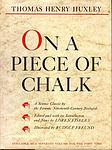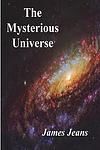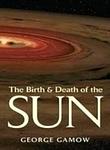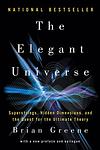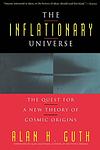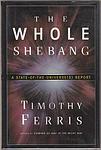The 13 Best Science Books for the General Reader
This is one of the 290 lists we use to generate our main The Greatest Books list.
-
Letters On England by Voltaire
The book is a series of essays written in the form of letters that offer a critical examination of various aspects of English society, including its politics, religion, and culture, during the early 18th century. The author, a prominent Enlightenment thinker, contrasts the relative freedom and tolerance he observes in England with the more rigid and hierarchical society of his native country. Through his observations, he praises the English constitutional monarchy, the country's scientific achievements, and its respect for individual liberties, while also reflecting on the nature of trade, the role of the press, and the philosophies of notable English figures. The work is notable for its advocacy of religious tolerance and freedom of thought, and it played a significant role in promoting English ideas to a Continental audience.
-
On the Origin of Species by Charles Darwin
This groundbreaking work presents the theory of evolution, asserting that species evolve over generations through a process of natural selection. The book provides a comprehensive explanation of how the diversity of life on Earth developed over millions of years from a common ancestry. It includes detailed observations and arguments to support the idea that species evolve by adapting to their environments, challenging the prevailing belief of the time that species were unchanging parts of a designed hierarchy.
-
On A Piece Of Chalk by Thomas Henry Huxley
"On a Piece of Chalk" is a scientific essay that explores the geological and biological history encapsulated within a simple piece of chalk. The author uses the chalk as a point of departure to discuss the profound implications of scientific discoveries about Earth's deep past. Through the examination of the chalk's composition, primarily made up of microscopic organisms from the Cretaceous period, the essay delves into themes of deep time and the interconnectedness of life and the planet's geological processes. The narrative serves as both a specific study of a common object and a broader reflection on the nature of scientific inquiry and understanding.
-
The Mysterious Universe by James Jeans
"The Mysterious Universe" explores the profound and often challenging concepts of astronomy and physics, presenting them in a manner accessible to the general reader. The book delves into the nature of the cosmos, the peculiarities of the quantum world, and the philosophical implications of scientific discoveries. It discusses how these discoveries have shifted our understanding of the universe from a mechanistic to a more mysterious, almost mystical view. The text is enriched with discussions on the limitations of human knowledge and the role of the scientist in a rapidly expanding universe of knowledge.
-
The Birth And Death Of The Sun by George Gamow
"The Birth and Death of the Sun" explores the life cycle of stars, including our own sun, from their formation in nebulae to their ultimate fates as white dwarfs, neutron stars, or black holes. The book delves into the physical processes driving stellar evolution, such as nuclear fusion and gravitational collapse, and discusses the broader implications for the universe, including the potential for life on other planets and the fate of the cosmos. Combining scientific rigor with accessible language, the book provides insights into the dynamic and ever-changing nature of the universe.
-
The Character Of Physical Law by Richard P. Feynman
"The Character of Physical Law" is a collection of lectures that explores the nature of the laws of physics. The book delves into the principles that govern the physical universe, discussing topics such as the relationship between mathematics and physics, the role of symmetry in physical laws, and the conservation principles that underpin the laws of nature. Through engaging and accessible language, the author provides insights into how physicists think about problems and develop theories, emphasizing the beauty and simplicity inherent in nature's laws. The work also reflects on the philosophical implications of scientific discoveries and the interconnectedness of various physical phenomena.
-
The Elegant Universe by Brian Greene
"The Elegant Universe" by Brian Greene is a captivating exploration of the fundamental principles of physics, delving into the intricate world of string theory and its potential to unify the laws of the universe. Through vivid explanations and thought-provoking analogies, Greene takes readers on a journey from the early discoveries of Newton and Einstein to the cutting-edge theories of quantum mechanics and relativity. With a blend of scientific rigor and accessible language, the book offers a compelling narrative that challenges our understanding of space, time, and the nature of reality itself.
-
The Selfish Gene by Richard Dawkins
This groundbreaking book presents a revolutionary perspective on the theory of natural selection. The author argues that genes, rather than individuals or species, are the true units of evolution. He suggests that these 'selfish' genes are driven by their own survival, leading to complex behaviors and characteristics in the organisms they inhabit. This work reframes our understanding of evolution, emphasizing the gene's role in shaping biological life and behavior.
-
The Making of the Atomic Bomb by Richard Rhodes
This comprehensive book provides an in-depth account of the development of the atomic bomb during World War II. It explores the scientific advancements that made the bomb possible, the political decisions that led to its creation, and the moral dilemmas faced by the scientists involved. The book also details the personalities of key figures in the Manhattan Project, the effects of the bomb on Hiroshima and Nagasaki, and the impact of nuclear weapons on the world.
-
The Inflationary Universe by Alan Guth
The book explores the concept of cosmic inflation, a theory suggesting that the universe underwent an exponential expansion in the first fractions of a second after the Big Bang. This expansion explains several puzzling aspects of the universe, such as its large-scale uniformity and geometry. The author, a prominent physicist, details the development of the inflationary model, discussing both the theoretical motivations and the empirical evidence supporting it. The narrative also delves into the implications of inflation for understanding the origin of the observable universe and the fundamental physics governing it, providing a comprehensive overview of one of the most influential ideas in modern cosmology.
-
The Whole Shebang by Timothy Ferris
"The Whole Shebang" is a comprehensive exploration of the cosmos, delving into the intricacies of the universe's composition, structure, and evolution. The book provides a clear and accessible overview of contemporary astrophysics and cosmology, discussing topics such as the Big Bang, black holes, and the possibility of life beyond Earth. It also examines the philosophical and theological implications of scientific discoveries about the universe, offering insights into how these findings relate to human understanding and our place in the cosmos. The narrative is enriched with discussions on the role of technology and observational techniques that have propelled our understanding of the universe to new heights.
-
Hiding In The Mirror by Lawrence M. Krauss
"Hiding in the Mirror" explores the fascinating history and current theories surrounding extra dimensions and the universe. The book delves into the world of physics and cosmology, examining how the concept of higher dimensions has evolved from its inception in mathematics and literature to its pivotal role in string theory. The author critically analyzes the allure and the scientific implications of this pursuit for hidden dimensions, discussing both the theoretical achievements and the ongoing challenges in unifying the laws of the universe. Through engaging narrative, the book provides insights into how our understanding of space, time, and the dimensions has shaped scientific thought and offers a glimpse into the potential future discoveries that could redefine our reality.
-
Warped Passages by Lisa Randall
"Warped Passages" explores the fascinating world of particle physics and the concept of extra dimensions in the universe. The book delves into how our understanding of the universe's structure might be profoundly different from what is perceived with the naked eye, discussing theories that go beyond the observable three dimensions. Through accessible language, the author explains complex theories of how these additional dimensions could influence gravity, cosmic forces, and the fundamental constituents of matter, potentially solving some of the most perplexing puzzles in contemporary physics.
The Guardian, 13 Books
Steven Weinberg, The Nobel laureate, lists his 13 best science books for the general reader
Added 13 days ago.
This list has a weight of 15%. To learn more about what this means please visit the Rankings page.
Here is a list of what is decreasing the importance of this list:
- Voters: 1 person voted
- List: only covers 1 specific genre
If you think this is incorrect please e-mail us at [email protected].


